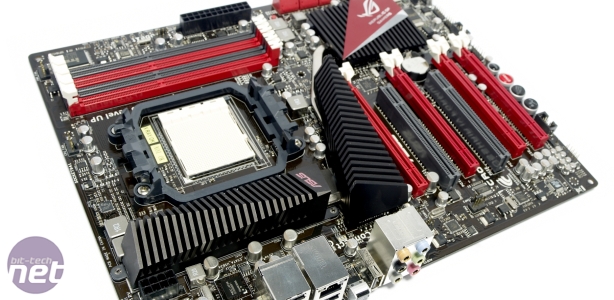
Performance Analysis
At stock speeds, the C4F performed well with an overall score of 1,059, which makes it as fast as Asus’ brilliant M4A89GTD Pro/USB 3. It was fast in Crysis too, with a minimum frame rate of 22fps. However, we saw slow performance from all the ports – the six SATA 6gbps ports transferred data at 184MB/sec, while the seventh port (powered by a JMicron JMB363 chip) was slower still at 168MB/sec. These speeds are slow enough to be a potential bottleneck for an SSD.The eSATA port, which is controlled by the same JMicron chip, was a touch slower at 165MB/sec. USB speeds were much better, with 35MB/sec transfer speed over USB 2 and 192MB/sec over USB 3.
After our overclocking efforts we saw a significant speed boost, with the overall score rising from 1,059 to 1,344, an increase of 27 per cent. We saw a jump in performance from Crysis too, with the minimum rising from 22fps to a much smoother 27fps.
Conclusion
Asus bills the Formula range of its high-end Republic of Gamers motherboards as ‘for gamers’ but very few of the features of this board really cater for this audience. Why does a gamer need voltage read-out points or a maximum vcore of 2.05V?We can see the point of the Turbo Key II button, as this one-press auto-overclocking technology resulted in pretty much all the extra performance that our manual (and fiddly) overclock yielded. However, we’re mystified as to why Asus also include two other automatic overclocking utilities (CPU Level Up and the Turbo Unlocker of the TurboV software) that result in a lower overclock than the Turbo Key II button.
Worse still, these utilities are incompatible and unaware of each other – Turbo Unlocker allowed us to enable it while Turbo Key was enabled, resulting in a system crash. Given that auto-overclocking is likely to be used by less technologically savvy people, the many options and their incompatibility is a disaster for the C4F. We'd bet that quite a few people would be tempted to enable all the overclocking utilities at once, rather than choose only one, with extremely unsatisfactory results.
While we disagree that this board is for gamers (who will want a competent, keenly priced board that leaves them with as much cash as possible to spend on a fast graphics card and more games) it is a solid motherboard for overclockers. It posted the highest maximum HTT we’ve ever seen, and the cooling is excellent.
But even taken in this light, the C4F fails to impress, as a comparably priced LGA1366 motherboard (and Core i7 CPU) will yield more performance from its overclock. Even Asus’ M4A89GTD Pro USB 3 offers much the same performance and overclockability, but for only £120. The C4F is therefore a pretty, but pointless, motherboard.
- Performance
- x
- x
- x
- x
- x
- x
- x
- x
- -
- -
- 8/10
- Features
- x
- x
- x
- x
- x
- x
- x
- x
- x
- -
- 9/10
- Value
- x
- x
- x
- x
- x
- x
- -
- -
- -
- -
- 6/10
- Overall
- x
- x
- x
- x
- x
- x
- x
- -
- -
- -
- 7/10
Pricing Update
The original price of £190 inc VAT quoted to us for this review was incorrect, the board actually costs £166.72 inc VAT from Scan. As the Crosshair IV Formula is superior to the MSI 890FXA-GD70 and cheaper, we've adjusted the Value score from 3/10 to 6/10, and the overall score from 6/10 to 7/10. Apologies for any confusion.
MSI MPG Velox 100R Chassis Review
October 14 2021 | 15:04









Want to comment? Please log in.